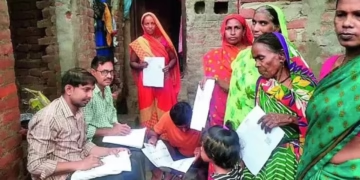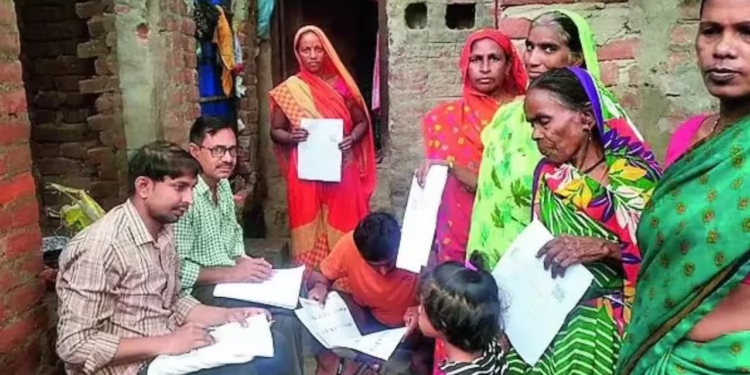A woman dhaba owner in Muzaffarnagar, UP, breaks down after her hard-earned business was destroyed by hooligans misusing religion to justify violence. Her emotional plea for justice highlights rising threats to small businesses in the name of faith.

The Supreme Court on Thursday refused to stop the Election Commission of India from carrying out the Special Intensive Revision (SIR) of electoral rolls in Bihar, where elections are approaching. However, the court suggested that the Election Commission should also consider using Aadhaar, voter ID, and ration cards to help update the electoral rolls.
The vacation bench comprising Justices Sudhanshu Dhulia and Joymalya Bagchi stated that it was leaving the decision to the Election Commission regarding the inclusion of the three documents. The bench added that the Commission is free to reject the suggestion if there are valid reasons but must provide an explanation for doing so.
The court also directed that the matter be listed for hearing again on July 28, before the publication of the draft electoral roll.
Justice Dhulia, who headed the bench hearing multiple petitions challenging the Special Investigation Report (SIR) in Bihar, including concerns about its timing, stated,
“There is an ongoing democratic process. You are free to question it, and we will certainly examine the matter. However, we cannot prevent a constitutional body from performing its duties. We won’t permit them to exceed their authority, but at the same time, they must fulfill their lawful responsibilities.”
He made these remarks after Senior Advocate A M Singhvi, representing the petitioner, urged the court to either direct that the revision process be conducted independently of the Bihar elections or, alternatively, to stay the process and hear the matter at a later date.
The bench suggested considering Aadhaar, voter ID, and ration cards for updating the electoral rolls after Senior Advocate Rakesh Dwivedi, representing the Election Commission of India (ECI), stated that the list of 11 documents proposed for the revision process was not exhaustive.
Intensive revision involves preparing the electoral roll from scratch through house-to-house verification by electoral registration officers.
Under the Bihar Special Intensive Revision (SIR), individuals listed on the 2003 electoral rolls only need to submit an extract from those rolls as proof. However, those enrolled after 2003 must provide one or more documents from a specified list of 11 acceptable documents, along with a pre-filled enumeration form (for existing voters), to verify their date and/or place of birth — which is then used to establish their citizenship.
In its order, the bench stated, “After hearing arguments from both sides, we are of the preliminary view that this case involves three key issues:
(a) The authority and powers of the Election Commission to conduct this exercise;
(b) The procedure and manner in which the exercise is being carried out; and
(c) The timeline, particularly the short duration allotted for preparing draft electoral rolls, inviting objections, and finalizing the electoral rolls — especially with the Bihar elections scheduled for November.”
We are also of the view that the matter requires a hearing. Therefore, let it be listed before the appropriate bench on July 28. In the meantime, the Election Commission shall file its counter-affidavit on or before July 21, and any rejoinder, if necessary, may be filed before July 28,” the statement said.
Mr. Rakesh Dwivedi has rightly pointed out that the list of documents considered by the Election Commission for voter verification includes 11 documents; however, this list is not exhaustive. Therefore, in the interest of justice, we believe that the Election Commission should also consider the following three documents for verification — the Aadhaar card, the EC voter ID card (EPIC), and the ration card — as these documents alone would suffice for most of the petitioners.
Dwivedi argued that mentioning additional documents in the court order could complicate matters, as the electoral process is already in progress. He urged the court not to include references to any additional documents.
However, Justice Dhulia clarified, “We are merely saying it is up to you to consider them. If you have valid reasons to reject them, do so and provide the reasons.”
The petitioners informed the court that they are not seeking an interim stay at this stage, since the draft electoral rolls are scheduled to be published on August 1.
In response, Dwivedi pointed out that the petitioners had initially sought an interim stay, and thus, the court should clearly state that the Election Commission of India (ECI) can proceed with the electoral process.
A petition filed by the NGO Association for Democratic Reforms (ADR) and others, including RJD leader Manoj Jha, has challenged the electoral roll revision process, raising concerns over issues such as the exclusion of Aadhaar and the timing of the revision, which coincides with the upcoming Bihar Assembly elections.
Senior Advocate Abhishek Manu Singhvi argued that if the court permits the process to continue, it should be separated from the elections. “Such a massive exercise should not be tied to an imminent election,” he submitted.
Justice Dhulia remarked, “If we decide on that, we would essentially be ruling on the case itself.”
Senior Advocate Gopal Sankaranarayanan, representing one of the petitioners, contended that the Aadhaar card is a valid document under the Representation of People Act. However, the Election Commission is refusing to accept it for Bihar’s voter roll revision.
He warned that if the process is allowed to continue without addressing this, it could create irreversible confusion. “If this goes on, it will be like an irreversible scrambled egg. Any continuation must be accompanied by widespread publicity that Aadhaar is an acceptable document,” he urged.
READF ALSO…….Vatsala: The Beloved ‘Nani’ Elephant of Panna Passes Away at 100, Leaving a Legacy of Love and Compassion















 Categories
Categories









